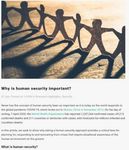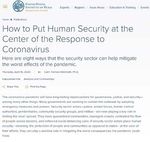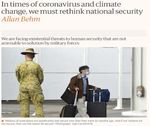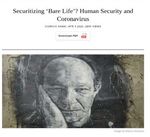COVID-19 The Importance of Human Security in the Age of - the United Nations
←
→
Page content transcription
If your browser does not render page correctly, please read the page content below
The Importance of Human Security in the Age of
COVID-19
Threats to people’s survival, livelihood and dignity brought on by COVID-19 illustrate how the
pandemic is much more than a health crisis. Beyond the immediate and devastating loss of
life, COVID-19 has resulted in a staggering rise in unemployment and a multi-pronged
global economic crisis. It has exposed fundamental weaknesses in the delivery of social
services, as well as systems of social protection and preparedness. As with most crises, those
already in precarious and vulnerable situations and least able to withstand additional shocks
to their wellbeing are bearing the brunt of the pandemic.
Recognizing the limitations of prevailing paradigms to effectively manage today’s complex
crises, a resurgence of interest in human security as a valuable framework for placing sustained
improvements in all dimensions of people’s lives has re-emerged as the foundation for thriving,
stable and inclusive societies. As such, human security offers an alternative perspective to
inspire a rethinking of how we prepare to tackle pressing global challenges; how we come
together as an international community to address them; what strategies are best suited to
protect and empower people, particularly those most vulnerable; and how we allocate resources
to this end.
In the context of a pandemic, human security acknowledges that health for all depends on
robust disease prevention systems, the availability of and access to quality healthcare, and the
broader conditions in which people live. It requires us to consider how health crises can
overwhelm economic systems and destroy livelihoods with knock-on effects on every aspect
of people’s lives. It promotes a combination of protection and empowerment measures that
improve early warning and preparedness, build the capacity of healthcare systems, mobilize
and educate the public, and shield the most vulnerable. And, human security emphasizes that
securing people in the face of complex threats can only happen through multilateral
cooperation and national partnerships that bring together diverse actors from governments,
academia, civil society and the private sector.
As COVID-19 accelerates globally, the time is now to place human security at the forefront of
our efforts to stop the spread of the pandemic, and to build back better towards a more
inclusive and resilient future where every man, women and child can live to their fullest
potential.Watch our short videos on health and human security
(click on images to watch videos)
Diverse voices advocating for human security
Nobel laureates and thought leaders are mounting a growing call to place human security at the
forefront of our efforts to tackle 21st century challenges, including building back better from the
current pandemic. Together, these diverse voices convey three common messages on the value of
human security. First, the failure to put people at the center of our efforts to ensure stability, safety
and prosperity has rendered us unprepared and insecure vis-à-vis today’s pressing global threats.
Second, it is imperative to espouse a broader approach that considers how issues related to the
economy, health, the environment, and inequality, among others, are intricately interconnected and
must be tackled in their full complexity. Third, given the world’s extensive economic and social
interrelationships, we will only be able to meet emerging and future challenges through solidarity
and cooperation, a strong multilateral system, and partnerships across government, academia, the
private sector, and civil society.
Below is a selection of these voices from March 2020 to the present.Mikhail Gorbachev: “When the Pandemic Is Over, the World Must Come Together” for Time Magazine Is it not clear by now that wars and the arms race cannot solve today’s global problems? War is a sign of defeat, a failure of politics. The overriding goal must be human security: providing food, water and a clean environment and caring for people’s health. To achieve it, we need to develop strategies, make preparations, plan and create reserves. But all efforts will fail if governments continue to waste money by fueling the arms race. President Moon Jae-In: “Special Address by President Moon Jae-in to Mark Three Years in Office” Building upon successful epidemic prevention efforts, we will lead international cooperation in the post-COVID-19 era while placing “human security” at the center. The concept of security today has expanded from conventional military security to human security that deals with all factors threatening safety such as disasters, diseases and environmental issues. We can cope with these only when all countries pull together through solidarity and cooperation. We will play a leading role so that Northeast Asia, ASEAN and the rest of the world can move forward toward the common goal of human security through solidarity and cooperation. I hope that South and North Korea will move toward a single community of life and a peace community by cooperating on human security. Ambassador Knut Vollebaek: “We need an expanded understanding of security” for VartLand One of the most important things we have learned is that our concept of security must be expanded. We have to come up again and polish the term "human security" - "human security", a concept of security that encompasses the whole of society and the whole of man.
Jonathan Granoff and Barry Kellman: “'National Security' is too Crude to Protect Us from Pandemics. It's Time to Shift to Human Security Instead” for Newsweek Focusing on human security is not limited to fighting pandemic disease. But pandemics throw it into the sharpest relief. They illustrate the truth that we're all in this together. A virus originating anywhere is a threat to everyone everywhere. We are in a war, not nation against nation, but humanity against a common affliction. Allan Behm: “In times of coronavirus and climate change, we must rethink national security” for The Guardian The wellbeing of both the citizen and the state is the goal of all sound public policy. Traditional security thinking fails to deal with the new security issues presented by global warming, and now, pandemics. These constitute existential threats to human security that are not amenable to solution by military forces. Yet they go to the heart of national security in current circumstances. Akiko Fukushima: “COVID-19 is a human security crisis” for the East Asia Forum The COVID-19 pandemic is not only a health crisis, it is a human security crisis — depriving our freedom from fear, freedom from want and freedom to live with dignity. The pandemic demands human security approach of comprehensive, across-the-board human protection and empowerment. Samantha Power: “How the COVID-19 Era Will Change National Security Forever” for Time Magazine […] we need to unite behind ending our decades-long over- reliance on the military, and building national and international mechanisms to protect people not merely from the last threat, but from the coming ones.
Hayley Watson and Kush Wadhwa: “Why is Human Security Important” for Trilateral Research […] the concept of human security is critical in building the resilience of civilian populations, working towards the promotion of security before, during and after a crisis and building stability and peace. To do so, it is necessary to develop a better understanding of the kinds of issues that threaten the security of people — of individuals and their communities. This is what we call — a people-centric, human security-focused approach to crisis. Calin Trenkov-Wermuth: “How to Put Human Security at the Center of the Response to Coronavirus” for the United States Institute of Peace The coronavirus pandemic will have long-lasting repercussions for governance, justice, and security—among many other things. Many governments are working to contain the outbreak by adopting emergency measures and powers. Security sector actors […] are now playing a key role in limiting the virus’ spread […] If security sector actors place human security—meaning, the protection of people and communities as opposed to states—at the core of their efforts, they can play a positive role in mitigating the worst consequences the pandemic could have. Giorgio Shani: “Securitizing ‘Bare Life’? Human Security and Coronavirus” for E-International Relations The Novel Coronavirus (COVID-19) […] arguably constitutes the greatest threat to human security since the ‘Spanish’ flu a century before. It has forced a fundamental rethinking of the way we live, how we related to others, and indeed, as some commentators have alluded to, what it is to be human.
Alain Nicol: “The Pandemic Is Laying Bare a Global Water Crisis” for Foreign Policy Exploiting and governing new technologies effectively will also be essential to support longer-term transformations required to better manage the world’s water resources. The world must fundamentally reassess the value of safe and secure access to water supplies for all. If it doesn’t, the poorest will be disproportionately affected, but all of us will ultimately suffer from the threat to human security. Izumi Nakamitsu: “Our common security in a post-COVID world” for UNODA, Friends of Europe Transatlantic Security Jam 2020 COVID-19 has taught us that global crises require trust and cooperation, and strong institutions. With a focus on human security, these are the principles on which new approaches to disarmament should be based.
You can also read



























































